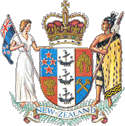Supreme Court of New Zealand
|
|
The Supreme Court of New Zealand is the highest court of appeal in New Zealand, having formally come into existence at the beginning of 2004, and sitting for the first time on 1 July 2004. It replaces the right of appeal to the Privy Council, based in London. It was created with the passing of the Supreme Court Act 2003, on 15 October 2003.
It is no relation to the "old" Supreme Court named in the 2003 Act, which was renamed in 1980 (as the result of a Royal Commission recommendation) as the High Court in anticipation of the creation of a court like the one that now bears its former name. This style of naming has its origins in the way the Supreme Court of Judicature of England and Wales was named.
Composition
The Supreme Court sits Wellington. It will eventually sit in the historic High Court building, located near Parliament, although is being housed in temporary facilities while this building is refurbished.
Inaugural judges were:
- Chief Justice Dame Sian Elias
- Justice Thomas Gault
- Justice Sir Kenneth Keith
- Justice Peter Blanchard
- Justice Andrew Tipping
The bench (with the exception of the Chief Justice, who had automatic appointment) were selected on seniority and merit. The four other judges were the most senior judges of the Court of Appeal.
On 4 May, 2005 the Attorney-General, Michael Cullen announced the appointment Justice John McGrath of the New Zealand Court of Appeal to the Supreme Court bench. Justice McGrath's appointment is due to take effect later this year following the retirement of Justice Sir Kenneth Keith.
Controversy
Although the desire and proposals for an indigeonous final appellate court can be traced back over a number of years, the creation of the Supreme Court was controversial. The Supreme Court Act was passed by a relatively small margin - the governing Labour and Progressive parties, supported by the Greens, voted in favour, while the National, New Zealand First, ACT, and United Future parties voted against. Opposition parties unsuccessfully called for a national referendum on the matter.
One issue that was particularly contentious was the appointment of judges to the Court, with opposition parties claiming that the Attorney-General, Labour's Margaret Wilson, would make partisan choices. These concerns were due to the fact that the entire bench was to be appointed simultaneously, and no clear statement had been made about how they would be selected. However, the level of concern was considerably lessened when Wilson announced that the appointments would be based on merit and seniority. Nevertheless, the issue of appointments still lingers; while the appointment of Justice McGrath was expected and unsurprising (McGrath being the next most senior judge on the Court of Appeal) whether future appointment will follow the same pattern remains unclear.
Cases
The first case to be heard by the Supreme Court was the matter of Donna Awatere Huata's expulsion from Parliament. Her former party, ACT, was appealing a decision by a lower court which invalidated attempts to expel her. The case began on 5 October 2004, and the court issued its judgement (unanimously in favour of ACT) on 18 November.
The court's second decision related to the case of Ahmed Zaoui, an Algerian asylum-seeker detained by the government because the Security Intelligence Service considered him a threat to national security. The Supreme Court decided to allow Zaoui to be released on bail, against the wishes of the government.

